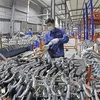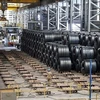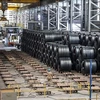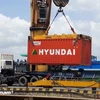
Hanoi (VNS/VNA) - A total of 134 out of 671 State-owned enterprises had reported cumulative losses amounting to 115.3 trillion VND (4.6 billion USD) in 2023.
Seventy-two others, accounting for 11% of the total State-owned enterprises, reported incurred losses totalling 33.7 trillion VND (1.35 billion USD).
Total pre-tax profits reported from the State-owned enterprises were 211.2 trillion VND (8.5 billion USD), down 13% from 2022.
Those were the major points of a report submitted by the Government to the National Assembly, regarding the losses and profits of State-owned enterprises and enterprises with state capital for last year.
State-owned enterprises are those in which the State holds 100% or more than 50% of its charter capital.
Those who posted profits included the Vietnam Oil and Gas Group (Petrovietnam) – 56 trillion VND pre-tax, the Vietnam National Petroleum Group (Petrolimex) – 3.08 trillion VND post-tax, the Vietnam Maritime Corporation – 1.7 trillion VND post-tax and the Saigon Newport Corporation – 5.07 trillion VND in total return.
Of those that reported losses, the Vietnam Electricity Group (EVN) registered losses of 26.77 trillion VND, which is an increase of 6.03 trillion VND compared to 2022.
The Government explained that during the first half of 2023, EVN had to mobilise high-cost electricity sources, while the prices of various fuels for electricity production remained high, which led to increased electricity generation costs.
Additionally, EVN is subject to State price regulation, meaning retail electricity prices do not sufficiently cover costs.
In the transportation sector, the Vietnam Airlines Corporation (VNA) incurred losses of nearly 4.8 trillion VND.
The Vietnam Cement Industry Corporation (VICEM) reported losses of over 1 trillion VND, primarily from its six subsidiaries (out of 10) and two joint venture companies (out of three).
Most of these companies were profitable in 2022, with only the Ha Long Cement Joint Stock Company reporting losses.
The Government explained that 2023 was a challenging year for the cement industry, with sales and revenues dropping despite price reductions.
In addition, the report also showed 93 out of 813 – or 11% – enterprises with State capital had incurred losses last year, amounting to a total of nearly 33.8 trillion VND.
A total of 169 others – or 21% – had cumulative losses totalling nearly 116.7 trillion VND.
State-owned enterprises lack full autonomy
According to the Government’s assessment, despite their crucial role in the economy as leaders and key players, some State-owned groups and corporations have not clearly demonstrated their abilities to lead and inspire others in their sectors.
Their contributions to enhancing the competitiveness of the economy and Vietnamese enterprises remain weak and the quality of their operations has not been commensurate with the resources they hold.
However, the Government acknowledged the restrictions that prevent State-owned enterprises from operating at full capacity.
For example, the laws stipulate that in certain cases, State-owned enterprises must ask for permission, or approval, from their State-owned representative authority and financial institutions, when making financial decisions, raising capital and making investments in foreign countries.
They must also comply with regulations regarding the scope of capital they can put in, or contribute to, establishing new enterprises, or adding more capital to them.
Regarding solutions, the government indicated it would continue to improve the legal framework for managing and investing State capital in enterprises.
State capital, once invested in enterprises, would be recognised as the assets of the corporate legal entity.
Enterprises with State capital would operate according to the corporate law.
The State would not manage the legal entities of these enterprises and would only act as the owner of the invested capital – meaning it would manage the flow of investments – without interfering in the administration and governance of the enterprises./.






















